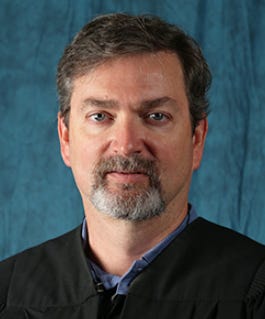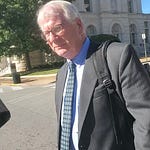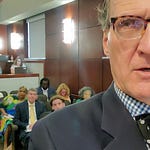I am not learned enough in the law to be succinct, I admit to criminal court judge Boyd Patterson, who is gatekeeper presiding judge in Hamilton County. He complains of the length of my 93-page complaint of fraud under color of TN financial responsibility law of 1977, “administered” by revenue and safety departments.
He also asks me to more securely place the effect of this fraud in a constitutional context. As one yearning for Christian liberty and constitutional guarantees of God-given rights, I am happy to oblige.
Short take —————————-
— Do 29 abrogations violate state law, demand end of program? Yes
— Maladministration of law damages the law, and the people who’re to be secured under it
Judge Patterson wants to make sure that our prosecution of this administrative barbarism against the poor first, and everybody else second, is within the constitutional framework. Bravo, Juge Patterson; bravo!
The main abrogation of God-given, constitutionally guaranteed, unalienable and inherent rights is that of communication by physical movement of one’s person and chattel on the public roads, the right to have and use property, the right to contract, and due process.
Travel rights undergird other rights
Department of revenue tells relator, among the poor in Tennessee, that if he doesn’t enter into contract to buy insurance, he may choose an alternate threat. (1) Give Mr. Gerregano a $65,000 cash payment, (2) stop using the public road for any purpose in an automobile or motor vehicle, or (3) face criminal prosecution from respondents’ agents and privies for enjoying use of private property, the Toyota RAV4 automobile.
The right to have and use property apart from privilege is constitutionally guaranteed. Phillips v. Lewis, 3 Shannon’s cases 230, 1877. Privilege law is upon acts of commercial nature for private profit and gain affecting the public interest.
The right to contract – or to not contract – is constitutionally guaranteed. No authority exists for a department or commissioner to criminalize use of the ordinary means of the day on the public right of way in exercise of individual rights of ingress and egress, and force the public into a contract with insurance or bonding agencies.
Free use of the people’s roads must be recognized, for by free use are many rights enjoyed. For example, press rights (Tenn. const. Art 1 § 19). Obstructing automobile use quashes this communication enjoyment.
The right of ingress and egress from one’s place is constitutionally protected, as noted in 13 Tennessee court cases cited to respondent Gerregano. Exercise of that right allows pleasure and comfort of a host of others, as follows:
All rights enjoyed in unison
Free exercise of rights of conscience in religion (Tenn. const. art 1, § 3), free assembly (Tenn. const. art. 1 § 23), right to open courts and travel there (Tenn. const. art. 1 § 17), suffrage and elections (Tenn. const. art 1 § 5), freehold, liberties or privileges, and right to earn living in calling of common right (Tenn. const. art. 1 § 7 and 8), right to property and contract (Tenn. const. art. 1 § 21) and due process (Tenn. const. art. 1 § 8).
No authority exists under the Tennessee constitution for any department or official to use extortion to forbid insurance industry noncustomers from using roads thrown open for public travel or use free of charge. T.C.A. § 67-5-204
Their overthrow of law denies relator a hearing before revocation in violation of his due process rights to a hearing before the axe falls. Hearings under TFRL are at T.C.A. § 55-12-103 in DOSHS. Beazley v. Armour, 420 F. Supp. 503, 506, 507, 509 (M.D. Tenn. 1976). Except in emergency situations, due process requires that when state seeks to terminate interest such as driver's license it must afford notice and opportunity for hearing appropriate to the nature of case before termination becomes effective. Bell v. Burson, 402 U.S. 535, 91 S. Ct. 1586, 29 L. Ed. 2d 90 (1971).
That five of every six motor vehicle registrants are rich enough to buy auto insurance doesn’t make respondents’ “Eye of Sauron” program less unconstitutional; that the poor suffer doesn’t make it more. Obstruction against the function of the law, however, reasonably afflicts the poor the most, as they have few means of dealing with sky-high premiums, criminal accusations under § 139, hauled-off autos and vehicles, tow company storage fees, and, if jailed, bail bond fees, sheriff department cash card-on-exit skims and loss of work hours.
Respondents and their privies use crime-preventing or conservator of the peace powers to arrest on sight all people whose evidences of commercial roadway use — registration tags and driver licenses — are not in good standing (revoked, suspended, expired). Police power practice in Tennessee operates effectively as a bill of attainder against private activity on the public road that does not affect the public interest and is not that for which the privilege is required.
The state of Tennessee on relation has standing, has stake in the outcome and claims the public interest against departure from law.









